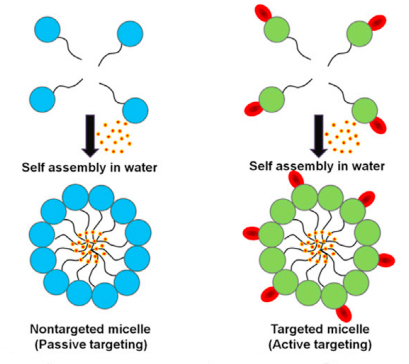Polymeric Micelles Drug Delivery System
Polymeric micelles (PMs) are a group of powerful nanocarriers for drug delivery system. Micelles are formed by spontaneous arrangement of amphiphilic diblock co-polymers in aqueous solutions. The micellar structures are comprised of a hydrophilic outer shell and a hydrophobic inner core; which allows hydrophobic drugs to be entrapped in the core of block copolymer micelles, or conjugated with the core of block prior to PM formation. The outer hydrophilic shell plays a crucial role in aqueous solubilization, cellular interactions and nanocarriers transportation.

PMs have a nanoscopic size ranging from a few nanometers to several hundred nanometers, which is essential for enhanced permeability and retention (EPR) effect. Due to the fact that they are composed of hydrophilic and hydrophobic units, careful selection of block segments and chain length can protect the drugs from metabolism or oxidation in the bloodstream; and subsequently increase the haft-life of drugs. Besides, with modifications on the surface shell, PMs can be used in site-specific drug release progress.
Advantages of the PMs drug delivery system:
- Prolonged drug circulation time;
- Control of drug-release;
- Targeted ligands for site-specific drug release;
- Quick and straightforward preparation process;
Our PMs platform provides a wide selection of polymeric materials for optimal hydrophilic and hydrophobic blocks. With our PMs drug delivery technology, Creative Biostructure aims to help our customer design and produce drug carrier systems of superior efficiency.
Table 1 Materials for polymeric micelles
| Hydrophilic unit |
PEG: poly (ethylene glycol) PEO: poly (ethylene oxide) PVP: Poly (vinyl pyrrolidone) |
| Hydrophobic unit | Polypropylene, polystyrene, poly (amino-acid), poly (ɛ-caprolactone) (PCL), poly (d,l-lactide) (PDLLA), poly (glycolide) (PGA) etc. |
Creative Biostructure promises to work closely with our customers to provide excellent services, and to provide our customers with prospective applications in drug delivery.
References
- Mohd Cairul Iqbal Mohd Amin et. al., Nanotechnology-Based Approaches for Targeting and Delivery of Drugs and Genes. Elsevier Inc. 2017, chapter 5.
